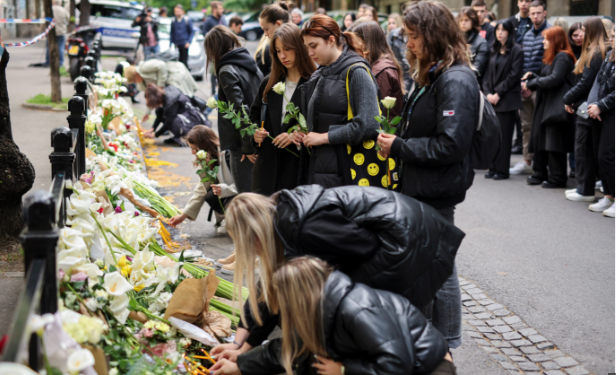In Belgrade’s central Vracar neighbourhood, the scent of burning wax rises up the slope of Svetozar Markovic Street, which is surrounded by trees. Votive candles placed against a wall of white flowers are eventually seen as the smell’s source.
The perimeter of Vladislav Ribnikar Primary School and the nearby high school are largely surrounded by the illuminated memorials.
There are images of the eight kids who perished in the shooting on Wednesday and scribbled notes from friends and relatives on the barriers in front of the main entrance.
Three girls are silently holding each other as they sit on the pavement. A short distance down the road, a father quietly converses with his three daughters as they arrange flowers. There are several people present, and there is a constant stream of arrivals and departures, but there is no buzz; instead, there is simply a silence.
It is impossible to overstate the difference from my previous visit to Vladislav Ribnikar. In 2013, I captured the school’s joyful slava celebrations, which honour St. Sava with music, dance, and theatre.
The nation is currently in mourning, just before one of Serbia’s greatest holidays, the slava for St. George. Not just for the victims of the mass shooting on Wednesday, but also for those who perished in a similar incident on Thursday near Mladenovac.
There is also a sense of loss for Serbia as it had been perceived by the public. This nation has secure schools and infrequent gun crime. The two major shootings have now shaken the long-held social assumptions of Serbians.
According to graphic designer Ana Djordjevic, “Part of the shock is because no one believed it could happen here.” Her niece studies at Vladislav Ribnikar, and she has a son who is 14 years old.
“My son informed me he can’t sleep because he doesn’t feel safe in his neighbourhood or at school any longer. The teachers must also be given time and space to process and recover.
Business as normal has been impossible for the majority of Serbians.
“The eerie atmosphere is palpable; nobody is laughing or listening to music. Voja Cekic, a server at a well-liked pub and restaurant in Belgrade’s Old Town, claims that if it weren’t for foreign visitors, there wouldn’t be any business.
Then Voja admits that he has a firearm at home—a Beretta pistol with a valid licence that belonged to his grandpa and was used by him to fight alongside the Partisans during World War Two.
He explains, “I preserve it as a reminder of my grandfather. Maybe it could be turned off so I could only have it as a memento, I thought. However, there are numerous illegal gun owners in Serbia.
Following the shootings, there has been much discussion over whether Serbia has a problem with guns. Serbia, behind Yemen and the United States, had the third-highest rate of civilian gun ownership in the world, according to a 2018 poll by the Swiss-based Small Arms poll.
Bojan Elek, the deputy head of the Belgrade Centre for Security Policy, calls the survey’s estimate of 39 guns per 100 persons “a wild overestimate.” But he thinks the government’s “disarmament” suggestions in the wake of the shootings will be widely embraced, at least at first.
People still find it shocking, and they want the government to act. However, ultimately those who possess weapons legally will become upset because they will believe they did nothing wrong.
Unease has been raised by some official responses to the shootings, like as Education Minister Branko Ruzic’s assertion that “Western values” are to blame. The long-stated desire of Serbia to join the EU seems to be at tension with this.
Zvezdana Kovac, secretary general of the European Movement in Serbia, which advocates for EU membership, calls the accusation against Western ideals “very shocking.”
One cannot say things like that if one truly wishes to join the EU, she asserts. It is inappropriate for a respectable government to utilise such an occasion for political ends.
The shootings have prompted quick action from Serbian President Aleksandar Vucic. He advises banning guns, having a police officer on patrol at every school, decreasing the legal drinking age from 18 to 12, and cracking down on weaponry.
However, the opposition parties remain unimpressed. On Monday, they plan to hold a protest march through Belgrade to voice their opposition to what they see as the administration’s attempt to impose draconian laws when the public is still reeling from the shootings.
According to Dobrica Veselinovic of the green-left movement Ne Davimo Beograd, “We don’t need more police in schools.”
“We need more psychiatrists, more teachers, and an open discussion with ourselves about where we stand in the world and how we view the past. Without that, we’ll be in a rut because we’ve had 30 years of bloody history and wars that we haven’t processed.
Processing the recent events is a difficulty in and of itself right now. Compared to a week ago, Serbia feels drastically different today.
The phrase “Belgrade never sleeps” typically refers to the city’s reputation for wild parties. The atmosphere is noticeably downbeat this weekend.














































